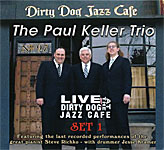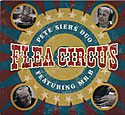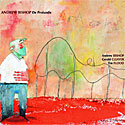Recent Recordings by Area Jazz Artists
The new release by the Paul Keller trio, Live at the Dirty Dog Café Set 1 (PKO Records, PKO 066) is an exiting and joyful document by three old friends: bassist Keller, drummer Jessie Kramer and pianist  Steve Richko. Richko played countless gigs with Keller and they had recorded five CDs together but this was to be among their last: Steve died in an accident soon after this performance was recorded. One cannot avoid reflecting with sadness on Richko’s untimely and unexpected demise while listening to this recital, but nothing here presages the fatal moment.
Steve Richko. Richko played countless gigs with Keller and they had recorded five CDs together but this was to be among their last: Steve died in an accident soon after this performance was recorded. One cannot avoid reflecting with sadness on Richko’s untimely and unexpected demise while listening to this recital, but nothing here presages the fatal moment.
From the opening “Soft Winds,” through twelve other tunes, the music swings with fine propulsion and the trio works in a manner that can only result from extensive mutual familiarity. This was not a studio session — and much of the excitement of a good night at a club date shines through the recording. Keller and Richko loved to dig into the rhythm and had grown to know each other’s sense of melody and harmony instinctively. Kramer fits in perfectly with his older band mates and shows a wonderful way with brushes. Steve’s love for both Oscar Peterson and Phineas Newborn is most evident and he tipped his hat to the latter on his own Blues for Phineas.
Live at the Dirty Dog Café Set 1 is a fine way to remember a warm man and wonderful musician.
Also on PKO is Flea Circus by the Pete Siers Duo featuring Mr. B (PKO Records, PKO 068). Mr. B — that is, Mark Lincoln Braun — plays piano and sings with drummer Siers on sixteen tracks, joined on one by trombonist Chris Smith and on the final Ypsi Gypsi by Nick Ayers on turntables, sampling, and assorted electronica and by another old friend, Kurt Krahnke on electric bass. Arwulf Arwulf wrote the learned and loving liner notes.
 Siers explains that he always wanted to play in the circus, and this recoding in some ways fulfills that desire. “Old-school entertainment with a flair for the outlandish,” he calls it. And indeed, this record has it all: two exuberant artists who share a love of history exchange musical ideas with charm, wit and heartfelt emotion.
Siers explains that he always wanted to play in the circus, and this recoding in some ways fulfills that desire. “Old-school entertainment with a flair for the outlandish,” he calls it. And indeed, this record has it all: two exuberant artists who share a love of history exchange musical ideas with charm, wit and heartfelt emotion.
The whole CD feels like an intimate get-together in a living room with a couple of beers as B digs into his wide-ranging repertoire and Siers delves into his equally extensive knowledge of jazz drumming styles, reaching all the way back to the classic press rolls of Baby Dodds and Zutty Singleton. But the seemingly effortless playing results from years of study and performance: from the opening Vicksburg Blues we are aware that this is serious stuff, as B once again pays homage to his old friend Little Brother Montgomery and demonstrates his personal way with the slow blues. After returning to an even slower poignant “When I Lost My Baby,” the duo slows down even more and adds trombonist Chris Smith for a short but lovely “Never Would Have Made It.” The recital ends with a complete change of flavor—with the party time “Ypsi Gypsy.”
The success of this wonderfully paced recording comes from a long lived love affair that both Siers and Braun share with the history of broad spectrum of American music. This love has led them to dig in deep and to immerse themselves in a manner that keeps older styles alive, saving them from the hand of the antiquarian reproducers.
Multi-instrumentalist and composer Andrew Bishop has led the same trio off and on for almost decades and has just returned to this format for De Profundis (envoi recordings, env501), featuring Bishop on flute, bass clarinet, soprano and tenor saxophone, Tim Flood on bass and Gerald Cleaver on percussion. The leader is a renowned classical composer as well as an instrumentalist who can perform with stylistic fidelity in just about every kind of music, from twenties jazz to modern classical chamber or jazz avant-garde settings, and on this recording the compositional framing provides a strong foundation for a wide range of improvisational tactics.
The frame consists of six modern tunes inspired by passages from the works of French composer Josquin Des Prez,  who was considered by many in 16th century Europe as the greatest composer of his time. Des Pres wrote primarily for voices — masses, motets and chansons — and Bishop ingeniously reimagines the rich timbres of such works within the sparse context of his trio. These are interspaced with other Bishop compositions that seem to have been inspired by his family life. Thus the opening “Introit-De Profundis I” begins with the leader on bass clarinet, using multiple higher sounds over bass notes to refer to, but not mimic the texture of a motet that served as the inspiration for the piece. Eventually this becomes a slow jazz ballad, as the other musicians join in.
who was considered by many in 16th century Europe as the greatest composer of his time. Des Pres wrote primarily for voices — masses, motets and chansons — and Bishop ingeniously reimagines the rich timbres of such works within the sparse context of his trio. These are interspaced with other Bishop compositions that seem to have been inspired by his family life. Thus the opening “Introit-De Profundis I” begins with the leader on bass clarinet, using multiple higher sounds over bass notes to refer to, but not mimic the texture of a motet that served as the inspiration for the piece. Eventually this becomes a slow jazz ballad, as the other musicians join in.
The next piece lies squarely with modern post-Coltrane jazz trio territory, led by the tenor saxophone, but the next installment frame inspired by the of the Renaissance master begins with flute whisper tones and bowed bass leading to full tone flute and bass dancing around, creating a completely different recall of older vocal timbres.
As the recital moves on Bishop switches to soprano and tenor saxophone but the mood remains pensive throughout, even when the tempos speed up. Because the compositions are so varied and the three musicians use their imaginations to the fullest, this mood never tires, indeed it works as a unifying feature that helps to make this more than just a collection of varied pieces. The final short full-composed “Benedictus,” scored for the low range of the bass clarinet, brings the recital back to the beginning.
In lesser hands, the use of a Renaissance vocal composer as inspiration for a distinctly contemporary jazz recording could have been nothing more than a gimmick, but De Profundis confounds such expectations. Bishop is profoundly immersed in all of this and has approached the album as a compositional whole, exploiting to the fullest his own own mastery of different instruments and the virtuosity of both Cleaver and Flood. This is music that defies standard categories, open to all, full of subtleties that reward repeated listening.